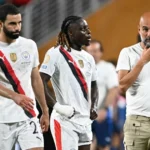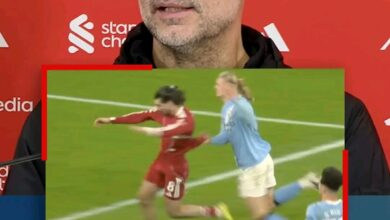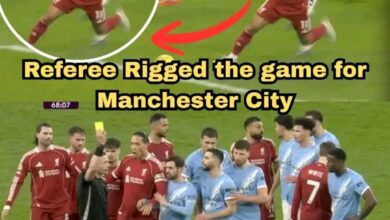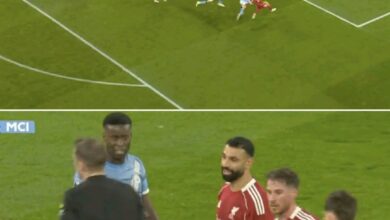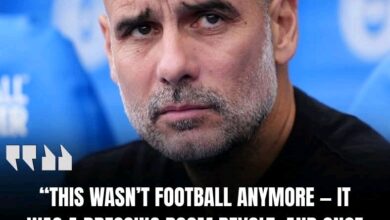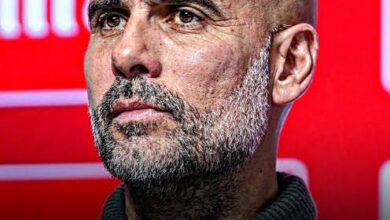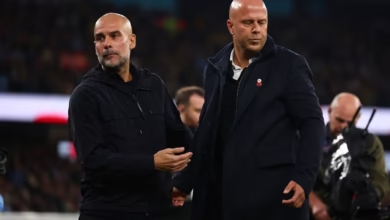Manchester City’s ageing squad brutally exposed by Real Madrid in Champions League defeat
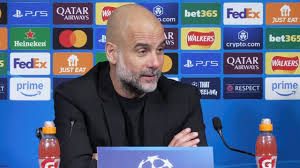
Manchester City’s relationship with the Champions League has always been one of unfulfilled promise. Despite their domestic dominance and massive investment in world-class players, a trophy that they yearn for more than anything has eluded them for years. The night at the Etihad against Real Madrid in the first leg of this season’s round of 16 showcased not only the stark difference in experience between the two clubs but also Manchester City’s unsettling fragility under pressure. As the match unfolded, it became evident that the prevailing issues at City — a lack of belief, aging key players, and a failure to manage key moments — were exploited ruthlessly by Real Madrid’s unwavering confidence and experience.
The match began with a defiant display from Manchester City’s supporters. The fans unfurled a large banner referencing last year’s Ballon d’Or ceremony, where Rodri’s victory had sparked anger among Real Madrid players, particularly Vinicius Junior, who was vocal about his frustrations over the result. The banner, emblazoned with the words “Stop Crying Your Heart Out,” was an attempt to taunt Real Madrid and to bask in Rodri’s moment of glory, as his Ballon d’Or win had been snubbed by the Spanish giants. It was a bold move, perhaps with the aim of unsettling their more seasoned rivals. But as the match progressed, it became clear that this bravado was misplaced. Real Madrid’s composure, built upon years of Champions League success, quickly put City in their place.
The defining moments came late in the game, after Manchester City had managed to take a 2-1 lead with just a few minutes remaining. It seemed as though Pep Guardiola’s side might finally overcome their mental block against Real Madrid, but just as quickly, the foundations of their lead crumbled. In a manner typical of Real Madrid’s trademark resilience, they clawed back two goals in quick succession, turning the tie on its head. The final whistle blew with Real Madrid ahead 3-2, and it felt as though the game had played out in the most predictable fashion for anyone familiar with the club’s European history.
At the heart of the collapse was a glaring contrast in mentality. Manchester City, once known for their clinical, machine-like performances under Guardiola, looked lost when faced with adversity. With the game on the line and the final minutes ticking away, City visibly faltered under pressure. There was no composure, no belief that they could see the game out. Their performance was marked by anxiety and hesitancy, reflecting the psychological toll of their previous failures at this stage of the competition.
In contrast, Real Madrid showed why they are the kings of the Champions League. Carlo Ancelotti’s men never believed they were beaten, even when they were trailing with only a few minutes left. Their history in these high-stakes situations is unrivaled, and the confidence that oozes from this team is something that City have yet to develop fully. Real Madrid didn’t panic when Brahim Diaz scored to level the game at 2-2; they didn’t lose their cool when the clock ticked down. Instead, they pressed forward relentlessly, knowing that the game was never over until the final whistle. Their winner came in injury time, a composed finish from Jude Bellingham after a scramble in the penalty area, making it 3-2
The psychological frailty of City was evident in this moment. Despite having been ahead in the game, they were undone by their own nervousness, and Real Madrid capitalized ruthlessly. The fact that Real Madrid, with their players filled with experience and big-game pedigree, took the lead in the final minute was a stark reminder of the gulf between the two teams in terms of mental fortitude
This loss was not a one-off. Throughout this season, Manchester City have shown signs of fragility, particularly when faced with adversity in big moments. This latest setback was their fifth such collapse in the current campaign, revealing a troubling trend. In their last five Champions League matches, they have conceded eight goals in the final 16 minutes, the most of any team. This speaks volumes about the lack of composure within the squad, especially when facing high-pressure situations like those they encountered against Real Madrid.
Guardiola’s team, once lauded for their flawless, fast-paced, and aggressive football, now appear to be on the decline. Key players are showing signs of wear and tear. Rodri, who has been the anchor of their midfield, was unable to feature due to a knee injury, and his absence was felt deeply. Jack Grealish, another vital component of City’s attacking play, was forced off the pitch with an injury in the first half, further disrupting their rhythm.
With Rodri sidelined, Manchester City lacked the control and composure he typically brings to the midfield. This was especially evident in the latter stages of the game when City were unable to manage the tempo and became increasingly exposed.
Additionally, the key players who had previously carried City through tough matches, such as Kevin De Bruyne and Bernardo Silva, were not at their best. De Bruyne, at 33 years old, appeared sluggish and less influential than in previous seasons. Silva, too, struggled to make an impact. The midfield looked labored and tired, and City failed to sustain the fluidity and intensity that had made them so effective in recent years
Meanwhile, Real Madrid’s experience was fully on display. Players like Vinicius Jr., Rodrygo, and the ever-dangerous Jude Bellingham provided a constant threat to City’s defense. Even though City’s defense initially held firm, Real Madrid’s persistence paid off. Vinicius Jr., who had been the target of City’s pre-match taunts, played a key role in turning the game in Madrid’s favor. His intelligent ball to Bellingham set up the winning goal, a reminder of his composure and the maturity of Real Madrid’s playmakers.
While City’s defense, led by the reliable John Stones, showed glimpses of solidity, they were ultimately overwhelmed by Real Madrid’s sustained pressure. The decision-making at the back for City was not up to the standard required in such a high-stakes environment. Real Madrid, in contrast, never panicked. Even after missing several chances, they kept their cool and waited for the right moment to strike.
Pep Guardiola’s frustration was palpable after the match. He acknowledged that his team had made poor decisions and lacked stability in key moments. He didn’t try to shield his players from blame, but instead, he pointed to the collective responsibility of the squad and himself. “We are just not stable enough,” he admitted. “This year, I accept when the opponent is better, but at the moment, I’m not good enough to give composure to the team to manage these situations.”
Guardiola’s admission of responsibility is both a sign of his leadership and an indicator of the challenges ahead. Manchester City, despite having a squad brimming with talent, continue to struggle when faced with the mental challenges that come with being in a pressure-filled environment like the Champions League. Their failure to see out the game against Real Madrid is yet another example of their inability to handle these situations, and it begs the question: Can Guardiola revive this team’s spirit before it’s too late?
As they now head to the Bernabeu for the second leg, City will have to find a way to overcome not just the formidable challenge posed by Real Madrid, but also the growing sense of doubt that pervades their performances. The margin for error is slim, and the pressure on Guardiola and his players has never been greater.
Real Madrid, on the other hand, continue to prove that their legacy in this competition is not just about skill but about something much deeper: an unshakable belief that they can never be counted out. The gap between the two teams in this regard could not be clearer. If City are to challenge for the Champions League again, they will need to find the mental resilience and stability that has always been Real Madrid’s hallmark
As the season progresses, one cannot help but wonder whether this marks the beginning of the end for Manchester City’s current iteration. The team is clearly aging, with key players like De Bruyne and Silva beginning to show signs of wear. Injuries are taking their toll, and the squad lacks the depth and freshness it once had. Guardiola will have to address these issues if City are to remain competitive on all fronts, but the current signs are not promising.
Manchester City may still have a chance to turn the tie around in Madrid, but the evidence is mounting that they are not the same dominant force they once were. The era of their previous dominance might be drawing to a close. Only time will tell if they can overcome the mental and physical challenges standing in their way.
For now, all eyes will be on the second leg in Madrid, where City’s future in the Champions League — and possibly their very identity as a team — will be on the line. Whether or not they can summon the courage to defy the odds and overturn this deficit remains to be seen. However, one thing is certain: this was a night where Real Madrid’s ruthless mentality exposed the cracks in Manchester City’s once-dominant side.
